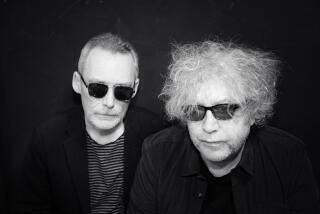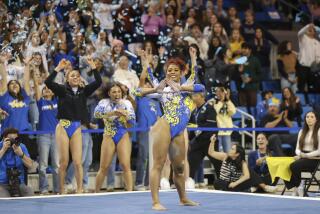A walk on the dark side
- Share via
Lou Reed has been puzzling and delighting audiences in almost equal measure since his old band the Velvet Underground surfaced in New York in the late ‘60s with often dark, unsettling songs that thumbed a nose at all that hippie optimism coming out of the West Coast.
So why stop now?
At the Wiltern on Tuesday, Reed -- dressed in his trademark black T-shirt and leather pants -- continued to move in mysterious but mostly satisfying ways.
In the opening moments of the 2 1/2-hour concert, rock’s onetime prince of darkness seemed almost cuddly as he playfully pointed out a hidden fourth chord in “Sweet Jane,” a song whose distinctive “three chord” riff has been so influential that scores of bands, including the Strokes, have made whole careers out of recycling it.
For anyone missing the old, mercurial Reed, however, he suddenly lashed out at the start of the first encore at a fan in the front row and wasn’t content until security guards had removed the guy, who, a cursing Reed insisted, had been distracting him all evening long with his chatter.
In terms of the show’s content, Reed, so known for his way with words that there are two books of his lyrics, seemed most inspired when losing himself in the music of his bandmates, treating them as partners in a communal workshop.
Reed, himself a limited vocalist and guitarist, graciously introduced three of his cohorts (bassist Fernando Saunders, cellist Jane Scarpantoni and a singer who goes only by Antony) before the first number and introduced the fourth (guitarist Mike Rathke) shortly after it.
The Rock and Roll Hall of Fame member delighted in the way Rathke could, through special effects, make the guitar sound like a piano, and he was so enchanted he all but took a seat in the audience himself when Antony took over in several places, displaying a voice almost as sweet and ethereal as that of Jimmy Scott.
For the set list, Reed sidestepped many of his hits, including “Walk on the Wild Side,” to perform tunes from various points in his career, the high point being a three-song summary of “Berlin,” his gripping 1973 concept album.
With the Velvet Underground and on his own in the ‘70s, Reed turned the whole notion of sex and drugs in rock upside down. Instead of viewing those topics chiefly as harmless aspects of the rock lifestyle, Reed pointed out their dangerous qualities.
Greatly influenced by such writers as Tennessee Williams and Raymond Chandler, Reed brought to pop all the dark shadows and pessimism of Hollywood’s film noir movement. His best tunes examined matters of obsession and addiction so seductively that you felt both the overwhelming lure and the disturbing consequences of walking on life’s wild side.
Though it was too dark to catch on with the pop audience of the ‘70s, “Berlin” is one of his most uncompromising looks at addiction, and his version of “The Bed” on Tuesday captured splendidly the numbing horror of gazing on a scene where a loved one cut her wrists.
On the album’s “How Do You Think It Feels,” Reed hooked up with Saunders, playing percussion, in a display of sheer musical fury that stretched on for several minutes. As the song’s power built, you felt Reed exorcising some of the pain of those days in ways that celebrated the survivors among us and that said another farewell to the ones who lost their way.
Reed could have taken the easy way out and rolled out the hits. But even if dated (“The Day John Kennedy Died”) or flimsy (“Ecstasy”), his choices gave the show a consistent sense of freshness and surprise. The last thing you want from Reed is predictability.
More to Read
The biggest entertainment stories
Get our big stories about Hollywood, film, television, music, arts, culture and more right in your inbox as soon as they publish.
You may occasionally receive promotional content from the Los Angeles Times.










